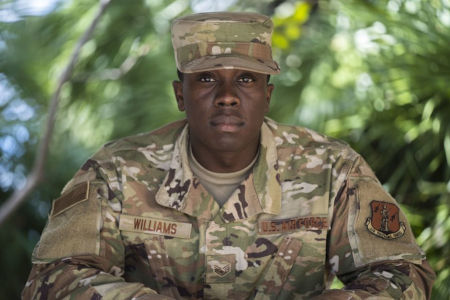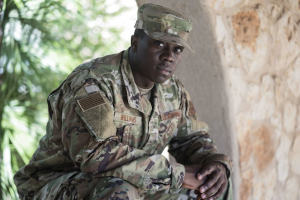Story by SSgt Briana Larson and TSgt Lynn M. Means, 136th Airlift Wing, TXANG
 Staff Sgt. Williams poses for a photo. (US Army National Guard photo by Staff Sgt. Mark Otte)
Staff Sgt. Williams poses for a photo. (US Army National Guard photo by Staff Sgt. Mark Otte)
NAVAL AIR STATION JOINT RESERVE BASE FORT WORTH, Texas -- “Say something.”
“I don’t know what made me make that call,” said Staff Sgt. De’Jon P. Williams, a 136th Airlift Wing photojournalist. “At that moment I told myself to say something. And I did, and I started to get help.”
Williams’ story shows the hope each of us can hold on to when we hit rock bottom, as he has come a long way from that day as a Senior Airman.
“Things had started to crumble,” said Williams. “My car got repossessed, I had just started my first day of school when everyone was called to support the Hurricane Harvey response, and it was then I learned some information in my personal life that tore me apart.”
It wasn’t right away that it all connected, said Williams. He had a mission to do and tried to stay focused. But when it finally hit him, it hit hard.
“It bothered me at the time, but the puzzle pieces hadn’t come together in my head just yet,” said Williams. “I went to cover a medical group that came to help us out in Houston. I don’t know what happened, but my mind just snapped. I lost it – I didn’t know what was going on.”
Williams immediately recognized something was not right, and he needed help.
“I remember flying with the medical group wondering what was going on with myself,” said Williams. “I was in autopilot the whole time, just trying to do my job taking photos. I wasn’t there in the moment – just doing my job with no context in my mind.”
As soon as he returned, he asked his supervisor for help.
“I reached out to Sgt. Overton, and told her I wasn’t doing so well,” said Williams. “I asked to talk to the First Sgt., who then reached out to Ms. Lynn, who was really helpful.”
Kathryn Lynn, the 136th Airlift Wing director of psychological health, was able to connect Williams with the first step in his road to recovery.
“The good thing was that I was proactive when I noticed something wasn’t right with me,” said Williams. “I spent that evening in the hospital. Sgt. Singletary drove me there himself. I knew I wasn’t going to hurt myself, but I couldn’t define this feeling – there were no words for it.”
It was after his initial breaking point when he began to notice small things would trigger him, said Williams. The tiniest things became the biggest stressors because of where he was mentally, as though every other day there was something to mess with him.
“For a couple of months, I only had my motorcycle,” said Williams. “When I was on my bike and it just started raining, those were some of my lowest times. I had to ride through torrential downpours just to get home, hiding under the overpass and waiting for the rain to stop. Sometimes I would sit there and think, ‘Well, if you think you can’t get no lower.’ That bike and I have literally been to hell and back together.”
Then another major event brought his world crashing down.
 Staff Sgt. Williams poses for a photo. (US Army National Guard photo by Staff Sgt. Mark Otte)
Staff Sgt. Williams poses for a photo. (US Army National Guard photo by Staff Sgt. Mark Otte)
“My grandmother had two strokes, and without thinking it through, I tried to get as close to home as I can be, which was Phoenix,” said Williams. “But I still had a lease in Texas and had to pay for that lease. I worked and slept at the Phoenix airport and got support from the United Services Organization there. Then I’d make my cot in the corner of the airport and sleep until my shift started the next morning and fly back to Fort Worth for drill. I lived that way for maybe two months.”
But Williams’ support had not ended with that first hospital visit. His mentors include Maj. Theresa Chrystal, the 136th Airlift Wing executive officer, Tech. Sgt. Lynn Means, the non-commissioned officer in charge of Public Affairs, and Tech. Sgt. Kristina Overton, his supervisor.
Williams said a lot of people were aware of his situation and reached out a lot to help him. Because of this, he was able to get counseling sessions every week and had help getting a car. And Maj. Chrystal was there every step of the way with phone calls and text messages.
“Really everyone at some point played a role,” said Williams. “Maj. Chrystal, Sgt. Means, Sgt. Overton – sending encouraging texts and calling, pulling me to the side to see how I’m doing and how they can help. Sometimes I felt singled out, but looking back on it I feel thankful. It was the small things, just knowing that somebody cares.”
The Wingmen who stepped in to help Williams can look back on those days and see how far he has come, attesting to the value of reaching out for help.
“Sgt. Williams is a real-world example of how stepping in and taking care of an Airman can truly change their life,” said Chrystal. “I can’t even explain the joy in my heart when I see the difference in this young man. It’s evident in everything about him that by investing in him and ensuring he had the resources he needed, his life was turned around for the better. It’s what makes me proud to be a leader – to be there to help Airmen make it through those times.”
The struggle doesn’t always end, but Williams found ways to cope, and is once again thriving in his role with the Texas Air National Guard.
“I have my moments even today,” said Williams. “There are still things that I deal with, but I allow myself space to deal with it, and wake up tomorrow with a fresh start. I work out a lot more, I set rules for myself, and I try not to carry burdens and issues.”
Williams has since excelled in a deployed mission, trained the deployed Public Affairs team, and even earned a promotion into the Non-Commissioned Officer corps.
“I am so proud to see how strong and resilient he is,” said Chrystal. “I cannot wait to watch both his life and career as he continues to soar. He is definitely a rescue story in the making!”
Williams looks back at his journey with confidence, thankful for the ones who stepped up, and hoping his story will encourage others to reach out.
“I want other Airmen to know it’s worth it - say something,” said Williams. “Bottling it in isn’t going to do anything but make it worse and you don’t want to find yourself in a position where you feel like you can’t make it out. Just sit with someone, talk to them and let it out for 5 or 10 minutes. It will help. Just say something.”